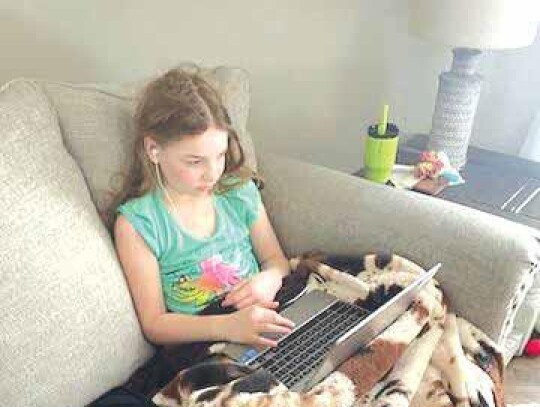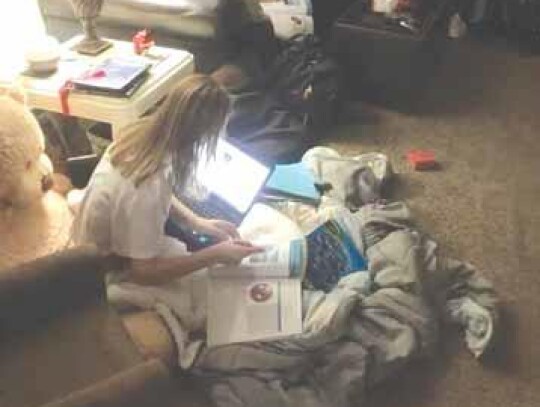This winter has been a doozie, especially for schools. In a year that has brought an unprecedented number of days where getting to school was impossible, schools have had to weigh how they will handle the less than ideal situation. Some schools, like Aberdeen, are tacking on make-up days at the end of the regular calendar and giving up holidays like Easter Monday. Others, like Watertown, decided to start earlier in the day and go later in the afternoon. And many, like Britton-Hecla and Langford Area, have fully embraced virtual learning.
Months ago, before there were mountains of snow everywhere, the Britton-Hecla School Board made some decisions regarding snow days. They would forgive the first five snow days. In other words, they would not have to make those up. Nowadays, requirements for how much school you have to have are measured in minutes of class rather than days, and B-H had plenty of contact hours built into the schedule even if five days were forgiven.
After the five ‘free’ days were expended, the B-H Board agreed to use virtual learning days. These would be days that counted as school where students would do lessons using electronic or physical means. Attendance would be mandatory, and work would be turned in. Administrators at B-H were happy to have this tool in their toolbelt but hoped they really would not need it.
“At the most, we thought maybe we would have to have three or four virtual learning days,” said B-H Superintendent Steve Benson. “Unfortunately, that wasn’t the case.” Right before Christmas, a big bad weather system kept students home for four days. By the end of that week, the forgiven snow days were used up and virtual learning was up to bat. Now, after an unrelenting winter, there have been a total of eleven virtual days.
While everyone emphatically agrees that face to face learning is best, B-H’s admins, teachers and parents have been thankful for the opportunity to use virtual learning as a tool. According to B-H’s principals Kyla Richter and Carrie James, virtual learning looks different for different grades and classes.
Richter, the Elementary Principal, says her students in kindergarten to second grade will largely take worksheets and packets home as well as having access to their teacher if needed.
Grades three and older all use Google Classroom as an electronic interface and have electronic devices to take home. James, the Middle and High School Principal, noted that lessons for her grades vary a great deal.
“They might do an actual lesson with a Zoom-type meeting. They might watch a video and take a quiz or they might have a reading assignment,” she stated. “We leave it up to the teacher because they know their students and what they need.”
Jen Boyko teaches Middle School Language Arts and Social Studies. On a virtual learning day for social studies, she says she might require her students to watch a video that has embedded questions. In a language arts class, she recently employed a virtual outlining tool for paper writing that her students used. “It was great,” she noted. “Students would build an outline, and I would type comments right there in real time. I don’t think I could have done it that efficiently if we were in the classroom.”
Middle and High School teacher Jenna Peters often uses something called Edpuzzle for her classes on virtual learning days. Edpuzzle is a video learning platform that combines video lessons, embedded questions, assessment, and practice all in one place. Peters can make videos of herself teaching a lesson or assign one of the EdPuzzle videos. Students have to watch the whole thing and then answer questions.
Gretchen Christensen, who teaches math and language arts, also employs a number of tools for her classes. “Google Classroom provides plenty of organized options for students to check in with their teachers and for teachers to send out practice problems, projects, videos, announcements, etc,” Christensen explained.
Peters and Boyko who both have kids at home, say they value virtual learning from a parents standpoint as well. “I have a first and fifth grader,” said Peters. “I see what they are working on, and it is real thoughtful work.”
Depending on how diligently they work, the principals note students may get done with virtual learning for the day by noon. They repeated that attendance and checking in is required and what students do on a virtual learning day counts towards an overall grade for a class. “We have always considered virtual learning work to be as significant as work in the classroom,” said James.
Whether students are engaged virtually just depends, say both the principals and teachers consulted. “Sometimes the engagement is less and sometimes it’s more,” said Boyko. “It all depends on that student. They have to be independent and do it on their own, and largely, I’m finding they are indeed doing it.”
The educators acknowledge that virtual learning does of course have its challenges. Not every single child or family in the school district has internet or reliable internet for instance. “We know what families don’t have internet,” said Benson. “Most can use a phone for a Wi-Fi hotspot, but teachers are also good about modifying assignments if need be.” He added that the district is planning to purchase some Wi-Fi hotspots to be used for next year.
They also say that they know it’s not reasonable to expect seven or eight hours of learning from home. “There has to be some balance between rigor and reasonable,” said Richter. Boyko added, “I’ve learned that it’s ok to make modifications and change an assignment. It’s ok to extend a due date. We can’t expect virtual learning to be just like the classroom.”
All agree that while they would rather be in the classroom, they are grateful for the virtual learning opportunity as opposed to other alternatives. “When we are missing single or possibly multiple days of school in a row, we believe it’s ultimately better to keep something in front of students than nothing,” said Benson.
The teachers concur. “If we miss a few days and my students do nothing those days, I end up using a whole day when we get back just reviewing and catching up,” said Peters. Boyko added, “These days are valuable compared to no learning at all. I would rather they do half of what they do in the classroom compared to nothing at all.”
Ultimately, the educators appreciate virtual learning being an option. “I am pleased our school was proactive in formulating a plan to keep educational goals moving forward as much as possible under the circumstances,” said Christenson. “I think just knowing this format is for one or two days, not several months, takes some pressure off both faculty and students to be perfect.”
Boyko emphasized, “Virtual learning is a win in my book.” And Peters reiterated the same sentiment from both the administrators and teachers who commented for this story: “This option is way better than tacking on days at the end of the year. When the weather gets nice, students just check out anyway,” she said.
At the end of the day, whether virtual or in person, students have to meet standards. “We are not just checking a box here,” said Benson. “These days are real school and virtual learning is probably here to stay considering how education in general is going.”
Still, Benson and the principals expect to do some evaluating at the end of the school year regarding virtual learning. Benson noted they may utilize a survey sent to families and will then consult with the school board as they move forward with plans for next year. He also predicts that the SD Department of Education and the state legislature may work together to establish clearer guidelines for virtual learning across the board.
In the end, as useful as they have found virtual learning to be, all parties are just hoping for a more pleasant winter next school year.
“When we are missing single or possibly multiple days of school in a row, we believe it’s ultimately better to keep something in front of students than nothing.”
---Steve Benson B-H Superintendent




